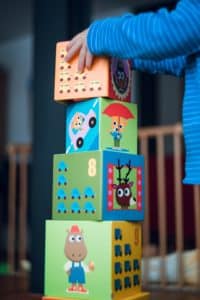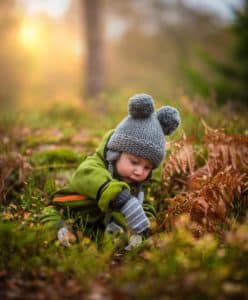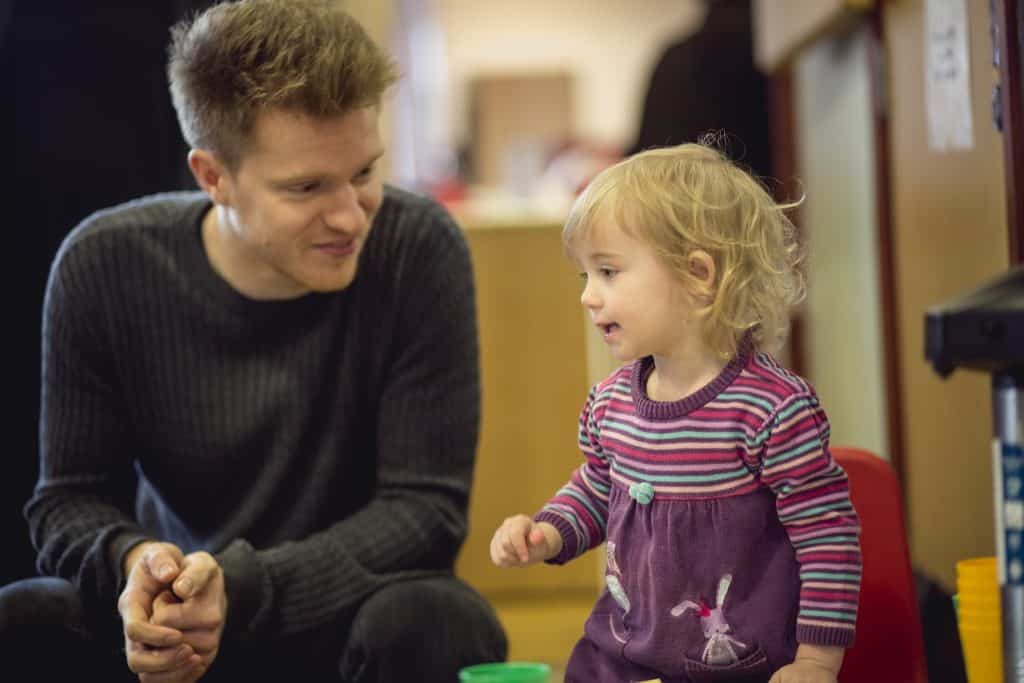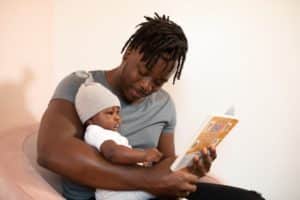
My name is Sandra Faucher, I am an Early Years Practitioner working for the Early Years Alliance Children and Family Centre’s in Lewisham running Stay and Play sessions.
First and Foremost looks at the importance of early communication in children.
FROM THE EARLY YEARS ALLIANCE FIRST AND FOREMOST
SUPPORTING YOUNG CHILDREN’S SPEECH, LANGUAGE AND COMMUNICATION
- SPEECH – the sounds children use to build up words
- LANGUAGE – understanding words- hearing and using them
- COMMUNICATION – the way language is used to interact with others (Verbal and non-verbal)
You are teaching your children new skills every day and talking is one of the most important. It may 
Strong language and communication skills are linked to better outcomes for children in school, build strong relationships and help children to become happy and confident.
The Early Years Alliance have some top tips for supporting your child’s speech, language and communication skills.
OUT AND ABOUT
Play and learning are the same thing for children and when they hear words linked to that play, everything becomes memorable.
Even before they can read the words, children will recognise the signs that surround them. Stepping outside of your home provides great opportunities to encourage speech. Being out and about at the moment comes with added restrictions and guidelines, however following the guidelines will not lessen the valuable experience and opportunity to develop their skills.
- Talk about the journey before you leave home, name the destination
- Talk about the different things you see on your journey, buildings, shops, people
- What numbers can you see on doors
- What number is on the bus you might see, sing wheels on the bus but change it to match what you are seeing the lorry, the car or the van
- Go on a listening walk, how many different sounds can you hear? Is it loud or is quiet?
OUT AND ABOUT WITH NATURE

- Jump in puddles – shout out 1, 2, 3, splash, then repeat!
- Extend their vocabulary by introducing some new words like squelch, splosh, splish
- Use lots of descriptive words, the wind is making the leaves dance in the air, the cold is making my nose glow
- Collect interesting things on the walk and talk about them later in the day
- Take a picture on a phone or get your child to draw a picture, collect some feathers, leaves or anything your child finds interesting and stick them around the edge of the picture or make a simple frame with sticks you collect, you will have lovely memories of being out and about with nature to talk about
AT HOME/EVERYDAY THINGS
Whether helping around the house, changing a nappy, bath-time, or simply eating a meal together, there are so many different opportunities to talk, listen and play with your child at home during everyday routines. Why not try cooking together?
- Preparing food together and mealtimes are social occasions with time to talk and reflect on the day. Making pizza is an ideal cooking activity.
- Count clothes in and out of the washing basket, naming each one as you do, 1 cardigan, 2 pairs of socks etc.
- Give simple instructions for your child to follow ‘can you find the other sock?’ etc.
- Make the bed together, while singing ‘there we ten in the bed and the little one said roll over, roll over, so they all rolled over and one fell out ….there were nine in the bed’ and so on. It might take a little longer to get that bed made but what a fantastic learning experience for your child and best of all great fun!
AT HOME/BEING TOGETHER
Just as adults need ‘me time’ to relax and unwind, your child needs ‘you time’. Playing games, sharing a book or browsing through photographs provides special moments for you and your child to talk and play together.
- Fill an empty plastic bottle or box with dry pasta or small stones; they can shake their instrument loudly when you say ‘go’. See how quickly they can stop when you say ‘stop’
- Play lots of turn taking games with your child
- Hiding game – as your watches, put some toys around the room (no more than five). Then, one at a time, encourage your child to find each one as you name them.
- Put together a treasure basket, children love to explore everyday items using all of their senses. For babies gather clean items in good condition like, a soft bristle brush, a silk scarf, a set of measuring spoons etc. Always remember to never leave your baby alone to explore the treasure basket use the time as an opportunity to introduce language into the activity.
SHARING STORIES AND RHYMES – INDOORS/OUTDOORS/ANYWHERE
Anytime is a good time for a story, rhyme or song – not just bedtime!
There are so many ways to tell a story, but one way to really involve your child is to ‘draw’ a story as you tell it. You do not have to be good a drawing, tearing pictures from an old magazine or comic works too.
- Keep a favourite children’s book or magazine with you, make the most of opportunities to look at it together, any time, any place, anywhere!
- Make lots of funny noises and sounds – play and have fun with the stories you tell
- Involve your child by encouraging them to guess what comes next, or by letting them correct you when you get it wrong!
- Make up silly stories and rhymes together by playing with words and sounds, ‘the greedy goat wore a coat’, then prompt your child with ‘the black bat wore a ….’?




